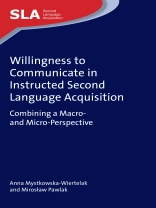This book offers a comprehensive account of individual differences variables as well as contextual factors that impinge on second language learners’ willingness to communicate (WTC). Firstly, it adopts a macro-perspective on WTC, which entails an attempt to identify variables that are related to WTC, taking into account the specificity of the Polish higher education setting. Secondly, it embraces a micro-perspective on WTC, striving to pinpoint the individual and contextual influences on levels of WTC in the course of regularly-scheduled, naturally-occurring English classes, as well as to capture the dynamic nature of WTC during such classes. Together, these perspectives bring the reader closer to understanding the mechanisms underlying WTC in specific contexts, thereby providing a basis for recommendations for classroom practice that could translate into learners’ success. It will be of interest to second language acquisition researchers and students, as well as to methodologists and materials writers who can use the research findings to improve the practice of teaching and learning speaking in the language classroom.
Table of Content
Introduction
Part One: Overview of Theoretical, Methodological and Empirical Issues
Chapter 1: Definitions and Evolution of the Concept
Chapter 2: Methodology of Empirical Investigations into L2 WTC
Chapter 3: Empirical Investigations of L2 WTC Antecedents
Part Two: Exploring WTC Antecedents in a Foreign Language Context: A Macro-perspective
Chapter 4: The Rationale for and Design of the Study
Chapter 5: Findings of the Study
Chapter 6: Discussion of the Findings
Part Three: Investigating WTC in the Course of Speaking Classes: A Micro-perspective
Chapter 7: The Rationale for and Design of the Study
Chapter 8: Findings of the Study
Chapter 9: Discussion of the Findings
Conclusions, Implications and Directions for Future Research
About the author
Mirosław Pawlak is Professor of English at the Faculty of Humanities and Social Sciences, State University of Applied Sciences, Konin, Poland, and the Faculty of Pedagogy and Fine Arts in Kalisz, Adam Mickiewicz University, Kalisz, Poland. His research interests include form-focused instruction, corrective feedback, classroom discourse, learner autonomy, learning strategies, motivation, willingness to communicate, pronunciation teaching, and study abroad.












